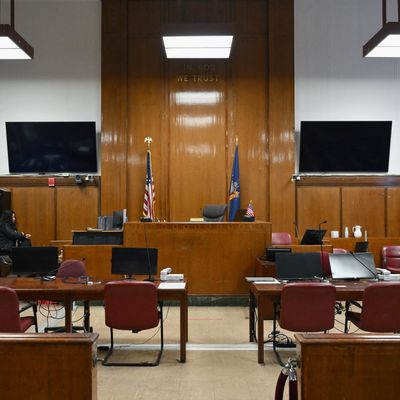
It’s a great miracle of our criminal-justice system that more juries don’t hang.
Consider the difficulty of getting any 12 people to agree on anything. Think about a group you’ve been part of that involves around a dozen people — for me, it would be a children’s sports team — and consider how tough it can be to reach a consensus. (I have seen contentious, weekslong email debates about whether the kids should play in the A- or B-level Memorial Day tournament; it gets ugly, fast.)
Now, imagine if those 12 people were thrown together by chance, not by like-minded pursuits. Next, let’s up the ante: The stakes of the group’s decision are enormous — not quite life-and-death but the next most consequential determination, liberty or prison. The choice, by the way, is binary, thumbs-up or -down with little room for creative compromise. Oh, and one more catch: Your decision must be unanimous. One dissenter tanks the whole enterprise.
Given all that, it’s a wonder any criminal case ever reaches a unanimous verdict. Yet the vast majority do.
There’s precious little recent, wide-lens data on the topic. One remarkable study of over 30,000 criminal trials in the late 1990s concluded that about 6 percent resulted in hung juries. My own sense, based on 14 years as a trial prosecutor and supervisor, is that somewhere around 5 to 10 percent of trials hang. I took a straw poll of about a dozen other experienced practitioners, and estimates ranged from 2 percent to 10 percent. Defense lawyers tended to come in a bit higher than prosecutors. (Hey, we’re all the heroes of our own tales.) One veteran defense ace told me proudly that he had hung precisely 23 juries over his career, which spanned 300-plus total trials. There is some variation, but we see a general consensus in the mid–single digits.

Third Degree
Subscribe on:
That said, the chances of a hung jury loom especially large in the ongoing hush-money-cover-up trial of Donald Trump in Manhattan. Now that the evidence is in with closing arguments next week, I certainly wouldn’t say a hung jury is the most likely outcome. A guilty verdict remains probable in my view — but the chances of a hung jury (and the resulting mistrial) are far higher than in a normal case.
The primary reasons so few criminal trials hang are also the most obvious: The defendant is usually guilty as all get-out, and the evidence is typically clear, clean, and compelling. Remember that prosecutors have the luxury of picking their battles and typically don’t indict a case until they are confident they can overwhelm a jury. In 2023, over 85 percent of federal criminal trials ended in convictions; outcomes vary in state courts, but by any measure, a healthy majority of trials wind up with guilty verdicts.
But the evidence against Trump is middling — not overwhelming, not patently deficient, but somewhere toward the lower end of that spectrum. Turns out there’s good reason why, in 2021, the famously aggressive Southern District of New York passed on charging Trump over the Stormy Daniels payments. Most important, the SDNY didn’t trust Michael Cohen and wasn’t willing to stake a case on his testimony. Manhattan district attorney Alvin Bragg’s predecessor, Cy Vance, didn’t quite formally pass on the case but also didn’t charge it before he left office at the end of 2021. In a February CNN appearance, I pressed Vance on why he hadn’t charged the case and asked for his view of Cohen. Vance responded, “He’s more than a problematic witness. He could be an exploding hand grenade for the DA’s office.”
Indeed, the prosecution’s case here rests largely on the word of a star witness who (1) is a convicted perjurer and fraudster who lies (or, in the prosecution’s telling, used to lie) the way most people breathe, (2) is driven to white-hot, all-consuming personal obsession with seeing the defendant rot in prison, and (3) has made millions peddling his hatred for the accused through books, TikTok, and merch.
Cohen is corroborated in key respects by financial documents and other independent evidence. But a jury cannot convict Trump without relying on uncorroborated aspects of Cohen’s testimony to link the defendant directly to the charged accounting crimes. Only Cohen has told the jury precisely what he and Trump had discussed about the Daniels payoff scheme, and he already got caught in either a bold-faced lie or a major mistake during his testimony about one such conversation — prompting one courtroom observer, my CNN colleague Anderson Cooper, to remark to me on air, “If I was a juror in this case watching that, I would think, This guy’s making this up as he’s going along, or he’s making this particular story up.”
Turns out Cohen also stole $60,000 from Trump in the same transaction at issue in this case, the alleged reimbursement for the Daniels payoff. (“Self-help,” as Cohen hilariously tried to spin it to the jury.) So much for the prosecution’s theory that Trump knew exactly what was happening when he signed $420,000 worth of checks to Cohen. On the contrary, Trump was actually getting fleeced by Cohen on that very same transaction, and the former president didn’t even realize it.
Still, even in the shakiest cases, the jury will find itself flogged by powerful institutional pressures to return a unanimous verdict. The judge will instruct jurors before they deliberate that they must keep open minds and work together to reach unanimity, if humanly possible. If the jury sends a note during deliberations saying it has hit a stalemate, the judge typically will ramp up the pressure by delivering a so-called Allen charge — or, as some defense lawyers call it, “the dynamite charge” or “the browbeating charge.” In essence, the judge will tell the jury, “Get the hell back in that jury room, and don’t come out until you’re unanimous. If you can’t get there, you’ve failed in your civic duty, and we’ll just have to retry this case again with the next group of suckers who get picked for the jury. So do your job now, and let’s get this over with.” (I’m paraphrasing.)
Of course, we have a uniquely polarizing defendant in Trump. On one level, the former president’s political divisiveness is a substantial liability in a Manhattan courtroom. Let’s face it, the guy is generally despised here on the Island at the Center of the World. He garnered a measly 12.3 percent of the vote in Manhattan in the 2020 presidential race, meaning 87.7 percent of the jury pool dislikes him politically and probably viscerally and personally as well. (I know jurors are supposed to leave their personal preferences at the courthouse door, and that’s a lovely notion but let’s be real here. Imagine we moved this trial to Woods County, Oklahoma, where Trump got 81.4 percent of the vote in 2020. Think he stands the exact same chance of conviction?)
But the numbers also work in Trump’s favor, even in deep-blue New York. If he catches one political sympathizer on the jury, that would be enough to hang. Even without a partisan holdout, the evidence is shaky enough that it could cause doubt in a politically disinterested juror, or even in one who leans against Trump politically.
Prosecutors have nightmares about hung juries. I mean this literally — I would sometimes wake up in the middle of anxiety dreams about one stubborn holdout juror kneecapping a case. I even wound up with a couple of my very own mistrials in real life. (We retried one case to conviction but dropped the other after the jury split.) While a mistrial is technically a “tie” of sorts, take my word for it: Any time the jury splits, prosecutors mourn and the defense pops bubbly.
Indeed, it’s harrowing for prosecutors to contemplate that a single holdout juror can frustrate years’ worth of work and prevent a case from reaching a satisfying conclusion. Bragg’s team can rest secure in the knowledge that most trials result in conviction and that theirs probably (probably) will too. But if ever a case posed a heightened risk of a hung jury, this is the one.
This article originally appeared in the free CAFE Brief newsletter. You can find more analysis of law and politics from Elie Honig, Preet Bharara, Joyce Vance, and other CAFE contributors at CAFE.com






























